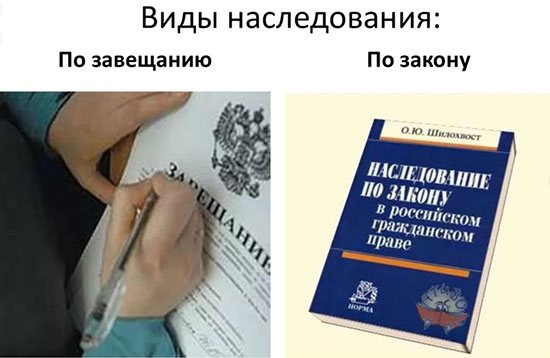Being the legal owner of property, a person can dispose of it at will. We are talking about donation, exchange, inheritance or sale. The transfer of property to relatives is most often carried out through a will. This document lists those persons who can claim the property of the testator, indicating the size of their shares. A testamentary disposition comes into force upon the death of the testator. Below we will look at how long a will is valid.
Challenging a will under the law
Issues of challenging a will are regulated in Art. 1131 Civil Code of the Russian Federation. In accordance with this normative act, in case of violation of the provisions of the law, a will may be declared invalid by a court decision or regardless of such a decision.
To challenge a will, the interested party must file a lawsuit in court after the opening of the probate case. There needs to be a good reason for this.
The basis for a challenge cannot be a clerical error or any minor violation of the procedure for drawing up, signing or certifying a document. It is important that the will of the testator is not understood ambiguously.
The law allows challenging not the entire will, but only part of it or individual orders. Invalidation of a specific order does not invalidate the entire document from the point of view of legislation.
The power of a will and who can challenge it
For the will to enter into legal force, it is necessary to submit an application to a notary to open an inheritance case. After this, the text of the document is read out, and the heirs are notified of the testator’s last will. The act is valid until the contrary is established.
The list of those who can challenge a will for inheritance is established in Art. 1131 Civil Code of the Russian Federation. Such persons include those whose property rights were infringed as a result of writing a declaration of will. In other words, an outsider will not be able to file a lawsuit (for example, concerned neighbors).
Typically, claims to challenge the testator's last will are filed by close relatives or spouses - those who could claim to receive property in the absence of a will. The vast majority of such legal proceedings are initiated by first-degree heirs.
Let's give an example. A man has died who, during his lifetime, made a will in favor of his partner. According to his will, she received an apartment and a dacha. The testator's daughter, when inheriting by law, would be the only heir of the first stage. She has the right to apply to the court to annul the will, since she is interested in this. But, let’s say, her maternal aunt will not be able to file a claim, since her property rights were not violated in any way.
Often, a claim is filed in court by the spouses of the testator in cases where he bequeathed property without the consent of the husband/wife. The fact is that citizens do not take into account the fact that everything that is acquired during marriage through paid transactions is the joint property of the spouses and is divided in half. In simple terms, the husband cannot bequeath the entire apartment to anyone, since by law he only owns 50% of this property.
When going to court, it will be necessary to prove that in the absence of a will, the plaintiff would have the right to receive the inheritance. Documents used as evidence are a birth certificate, a certificate from the registry office, a marriage certificate, etc.
Is it permissible to challenge a will before the opening of the inheritance?
According to the law, challenging a will before the opening of the inheritance is not allowed. The opening of the inheritance occurs after his death or recognition as missing in court. This is explained by the need to maintain the secrecy of the will.
The testator is not obliged to notify other persons about what he wrote in the document and what his will is regarding the property. He can do this at will, but he has no obligation to notify the heirs.
After the death of the testator, the will can be issued to the heirs, whose names are indicated in the text of the document. A testamentary act is granted only on the basis of presentation of a certificate of death of the testator.
Everyone who participated in its execution is required to keep the secret of the will:
- witnesses;
- notary;
- translator;
- a person who has the right to sign the act instead of the testator for objective reasons;
- executor;
- the person certifying the will instead of a notary (for example, the captain of a ship, the chief physician of a medical institution, the commander of a military unit, etc.).
Administrative liability is provided for failure to maintain the secrecy of a will.
Accordingly, since no one knows about the contents of the document, challenging it before the opening of the inheritance case is impossible.
Formation of inheritance contracts
These changes will also apply from the beginning of June 2021. A distinctive feature of this act is that after the death of a citizen it will not be necessary to obtain consent from legal successors regarding the acceptance of the mass. This means that the property mass is transferred on the basis that the citizen has died. To form an agreement, you will need to contact a notary. This applies to situations where the distribution of objects classified as real estate occurs. In addition, rules have been established according to which registration of paper with the Rosreestr authorities will be mandatory. Citizens have the opportunity to enter into contracts with both individuals and legal entities.
IMPORTANT !!! The applicant may be a person who is under age. In such a situation, when forming such a paper, his legal representatives must be present. It’s not just parents who are considered this way. The legislator also includes guardians among them.
As with the usual method of distributing the inheritance, the rules of compulsory share apply to persons who are minors or lack legal capacity. The agreement is applied to protect the rights of both parties. This paper will require an assessment of the items that will be transferred.
To ensure the properties of legality, it is necessary to appoint a person who will perform supervisory functions. This person ensures that obligations are fulfilled accurately. In addition, you can reflect the conditions that must be met before accepting the inheritance. For example, this may be a duty related to providing comfort to the deceased's pet.
The agreement can be terminated if certain conditions are met, including:
- the presence of a mutual agreement;
- appeal to a judicial authority (in this case, only one of the parties can act as an initiator).
In some situations, the act in question is considered to be inconsistent with reality. In particular, this happens when a citizen refuses to fulfill the duties assigned to him by paper. By the time the documentation is signed, the party is recognized as having lost legal capacity. At the same time, this fact will need to be confirmed with documents. In addition, this can happen when the conditions specified in the agreement are not fulfilled for valid reasons. For example, if a person has health problems.
Reasons for challenging a will
The grounds for challenging a will after the death of the testator may be general or special. Common reasons include the following:
- the testator could not be aware of the actions being performed due to the presence of a psychological disorder;
- the testator suffered from senile dementia;
- the will was drawn up while under the influence of alcohol or drugs;
- the text of the document does not correspond to the actual will of the testator;
- the document was formatted inappropriately.
Special grounds for challenge include:
- making a will under pressure or threats;
- drawing up a document with gross errors (for example, there is no signature of the testator);
- the document was drawn up by a group of persons, and not just the owner of the property;
- the authorized person did not have the right to certify the testamentary act;
- the signature was forged and this fact was proven;
- the heir specified in the will is declared unworthy by a court decision.
Proving the existence of these circumstances is often difficult. A medical examination and witness testimony may be required. A competent lawyer will prepare an evidence base and do everything possible to win the case.
Please note that minor clerical errors, typos and errors in design cannot become a reason for challenging and invalidating a will.
Factual circumstances of the case regarding the acceptance of inheritance by persons
This material is written on a real case, the situation was as follows - the heir did not know that one of his distant relatives had drawn up a will (partially) in his favor. At the same time, he was present at the funeral, where relatives (first-line heirs, as well as under the will) hid from him that the deceased had mentioned him in the will. When relatives opened an inheritance case with a notary and one of them, who was also mentioned in the will, accepted the inheritance, he hid the information that he had information about the place of residence of the second person indicated in the will. Thus, not knowing about the existence of a will, and assuming that the testator did not leave an inheritance in his favor, the heir did not contact the notary within six months.
How to challenge a will
Disputes regarding the validity of a will are heard in court. The challenge process follows the following algorithm:
- Determining the basis for the challenge.
- Collection and preparation of evidence that will confirm the existence of grounds for challenging.
- Drawing up a statement of claim. Determining the judicial authority where the claim should be filed.
- Payment of the state fee for going to court. Details can be found in the office or on the website of the judicial authority.
- Filing a claim.
- Taking part in court hearings.
- Entry of the decision into legal force.
If the decision is made in your favor, after it enters into legal force, you must obtain a certificate of accession to inheritance rights. If you do not agree with the decision in the case, you can challenge it in a higher court.
It is worth trying to resolve the issue with the heir under the will peacefully. Perhaps you will be able to negotiate and come to a compromise. In this case, an agreement is drawn up and certified by a notary.
An heir who has received property illegally may try to dispose of it. For example, sell. To ensure the safety of the inheritance, it is necessary to send a corresponding application to the court. In such a situation, the court imposes an arrest until all circumstances are clarified.
After the will is revoked, in most cases, the persons named in the document will be able to participate in the distribution of the inheritance by law or on the basis of another will recognized as valid.
The timing of registration of an inheritance depends on the methods of its acceptance.
There are two mechanisms for accepting an inheritance: at the request of the successor and actual acceptance. An application for accession to inheritance rights is submitted if the person lived separately from the testator.
A six-month period has been allotted when it is necessary to formalize an inheritance after death if the heir and the testator lived at different addresses.
This procedure is provided for in inheritance by law and by will. Upon actual acceptance, there is no need to submit an application to a notary. This is explained by the fact that the heir, by virtue of living together with the testator, has already assumed his rights, since he continued to use the inherited property after the death of the relative.
What the law says regarding deadlines
When it is possible to register an inheritance after death is specified in the Civil Code of the Russian Federation.
The time frame for registering an inheritance after all successors have assumed inheritance rights ranges from 6 months to 75 years.
A six-month period is provided so that all heirs have time to inform the notary about their existence and submit the relevant documents. Then, after the specified period, the notary has the right to issue a certificate of inheritance.
Registration of inheritance rights requires certain financial costs. Sometimes citizens do not have the means to immediately complete the necessary paperwork. For this reason, the question arises how long it takes to register an inheritance. It is not necessary to re-register the property immediately after 6 months. This can be done in a year, or two, or maybe more.
Please note: an open inheritance file is stored in a notary’s office for 75 years, which means you can complete the paperwork at any time.
Is it possible to speed up the registration process?
If for some citizens the process of re-registration of inherited property seems too costly, then others, on the contrary, want to speed up this process in order to quickly sell, donate or rent out property.
Since civil legislation defines clear deadlines, notaries do not have the right to go beyond the requirements established by law. In this regard, it is not possible to reduce the processing time (less than 6 months).
Another thing is that the heirs have the right to control that the notary does not delay the process without objective reasons. If six months have passed, the heir has submitted the necessary documents and then applied for the issuance of a title document, but never received it, he can file a complaint with the Ministry of Justice, to which notary offices are accountable.
Claim to contest a will
Cases of challenging a will are heard by courts of general jurisdiction. The claim must be filed at the place of residence of the defendant. In cases where the claims relate to real estate, the case is considered at the location of such property.
The claim is drawn up according to the requirements set out in Art. 131 Code of Civil Procedure of the Russian Federation. The text must include:
- identification data of the plaintiff and defendant - full name, residential address, contact information;
- identification data of the testator;
- essence of the dispute;
- grounds for invalidating a will;
- the cost of the claim (the estimated value of the disputed property);
- claim to court;
- list of attached documents;
- date and signature of the plaintiff.
It is important to correctly draw up a statement of claim, since otherwise the court may refuse to open proceedings. It is advisable to contact a lawyer for assistance in registration. Correctly drafting a claim will increase the chances of winning the case.
There is no established list of documents for filing a claim. Papers are prepared depending on the situation. The list includes:
- general passport;
- death certificate of the testator;
- documents confirming the degree of relationship with the testator (they also serve as the basis for going to court) - birth certificate, marriage certificate, certificate from the registry office;
- witness statements;
- letters and correspondence of the testator with other persons, if they are relevant to the case;
- documents from medical institutions;
- results of the examinations carried out;
- other papers.
If necessary, you can request the necessary documents through the court. For example, a judicial authority can make a request to Rosreestr to find out what property is owned by the testator.
Features of inheritance by will
A will is an official document containing information about the disposition of one's own property by its maker at his discretion in the event of his death.
According to the legislation of the Russian Federation
, a will drawn up in writing must be certified by a notary.
A will can be:
- Open - when the text of the document is presented for review by the notary and other witnesses present;
- Closed - the document is drawn up in handwritten form and handed over to the notary in a sealed envelope, which is opened by the notary within 15 days from the date of transfer of the Testator’s Death Certificate to him.
How to challenge an inheritance without a will
To challenge an inheritance without a will, you will need to go to court. This is the only way to establish the legality of inheritance. For this to happen, you need to follow the algorithm:
- Compliance with deadlines for filing a claim.
- Preparation of documents confirming the existence of grounds for challenging the inheritance.
- Filing a claim in court.
- Taking part in the trial.
- Obtaining a court decision.
- Contacting a notary office to cancel a previously issued certificate of accession to inheritance rights (if the court decision is positive).
It is important to consider the statute of limitations for all inheritance cases. As a general rule, it is three years, but in some cases this period may increase or decrease. It all depends on the grounds for challenging the inheritance in court.
The limitation period begins on the day the inheritance case is opened. However, in some situations, the heir learns that his rights have been violated much later. Then the period will be counted from the moment he is informed about it. For example, this can happen if the heir is outside the country and for some reason it is impossible to contact him.
Regardless of the grounds for filing a claim, it is necessary to adhere to the legal standards adopted by law. In accordance with Art. 131 of the Code of Civil Procedure of the Russian Federation, the claim must contain the following information:
- name of the judicial authority to which the application is submitted;
- details of the plaintiff and defendant;
- a description of the circumstances under which the plaintiff’s rights were violated;
- evidence of circumstances;
- claim;
- the cost of the claim, if the valuation is required by law;
- list of attached documents;
- date of filing the claim;
- plaintiff's signature.
The claim is filed at the place of residence of the defendant or at the location of the real estate about which the dispute is initiated. However, if the matter concerns issues of actual inheritance or establishment of other legal facts, it is necessary to apply at the place of residence of the plaintiff.
Legal position on restoring the period for accepting an inheritance from a person who did not know about the will
Based on the above sources of law, a position can be formed as follows. A person who missed the deadline for accepting an inheritance due to the fact that he did not know about the existence of a will has the right to restore the deadline for accepting an inheritance on the following grounds:
In accordance with Art. 1155 of the Civil Code of the Russian Federation - restoration of the period for accepting an inheritance, possible if there are good reasons. The list of valid reasons is not fully given by the legislator, and the reasons specified in Article 1155 of the Civil Code of the Russian Federation and given in paragraph 40 of the RF Supreme Court Order No. 9 dated May 29, 2012 can be supplemented by the court and their understanding can be expanded. The court has discretionary powers to determine whether the reasons for the heir missing the deadline for accepting the inheritance are valid. (Determination of the Constitutional Court of the Russian Federation dated April 23, 2015 No. 810-O) Considering that, according to paragraph 4 of Article 1 of the Civil Code of the Russian Federation and Art. 10 of the Civil Code of the Russian Federation, the good faith of the parties is presumed in the course of customs of behavior in society, and this rule was violated by a person (heir) who hid from the notary the location of another heir under the will, then the rights of such a person must be protected by law. The conscientiousness of a person who missed the deadline for accepting an inheritance is confirmed by the fact that, not knowing about the existence of a will and in the absence of a primary degree of kinship in relation to the testator, such a person could not know that he was called to inherit, and as a consequence of the need to enter into an inheritance in six month period.
Time limits for challenging a will
The statute of limitations for challenging a will is the time period during which a person whose rights have been violated has the right to go to court to obtain protection. The statute of limitations will depend on the basis for the challenge. This is provided for in Art. 181 Civil Code of the Russian Federation.
Thus, you can file a lawsuit and challenge a will within the following time:
- three years if the requirements relate to the application of the consequences of the invalidity of a void transaction and its recognition as invalid;
- one year upon request to recognize a voidable transaction as invalid, as well as to apply its invalidity.
The calculation of the period begins from the moment when the interested person learned about the violation of his rights and interests.
Validity of a will for inheritance
The will of a deceased person is recognized as a transaction concluded unilaterally. An indispensable condition for mandatory execution is the death of a subject who owns certain property and has the goal of distributing it among relatives. At the same time, the temporary ambiguity of the execution of this transaction affects the emergence of various questions about the validity period of this document and the period for its acceptance in the process of distribution of inherited values.
Testamentary document.
It should be immediately noted that the incorrect form of its execution or certification by a notary provokes the loss of its significance - it will not be used in the process of accepting the inheritance of property.
The provisions of the Civil Code of the Russian Federation provide for the existence of 4 types of this document:
- inheritance agreement (Part 1 of Article 1118 of the Civil Code of the Russian Federation);
- a joint will drawn up by spouses (Part 4 of Article 1118 of the Civil Code of the Russian Federation);
- closed will (Article 1126 of the Civil Code of the Russian Federation);
- a will drawn up in the presence of emergency circumstances (Article 1129 of the Civil Code of the Russian Federation).
Each of the varieties is compiled in full accordance with the recognized form. In this case, the following points apply to all of the 4 types:
- mandatory for each document are indications of the place and time of its preparation, information about the testator and the heirs provided for in the will;
- mandatory certification of the document by a notary or another person authorized to perform this action is immutable. This requirement also applies to a will made during an emergency if its author has survived and is no longer under the influence of a threat to life;
- the testator is obliged to personally sign the document certified by a notary; if for objective reasons he does not have such an opportunity, his authorized representative must sign the will (and his power of attorney must be notarized);
— the document must contain information about the property being left as an inheritance, not only what the testator currently has, but also planned for acquisition in the future.
If you need the help of a qualified lawyer, then call us for an initial consultation:
The period during which, according to the will, the heir can enter into inheritance rights.
In accordance with the provisions of Article 1154 of the Civil Code of the Russian Federation, the heir (and this in no way depends on the method of acquiring this inheritance) is obliged to apply for its registration after the expiration of the mandatory time period. For people whose rights are specified in the will, this period is equal to six months from the date of death of the testator. This time is specifically intended for potential heirs to prepare the relevant documents and contact an employee of the notary office.
The period during which the document is considered valid.
The legislation in no way limits the time of its validity. Accordingly, the date of its execution does not have any special significance, except for those cases when a different form was subsequently drawn up, or documents that abolished its significance.
However, an inheritance lawyer in Yekaterinburg
claims that some points are present in the legislation.
For example, a will
drawn up during an emergency has a limited
validity period
. Typically this time is limited to:
- 1 month, if the emergency has passed and the testator no longer has the slightest threat to his life;
- half a calendar year from the date of death of the testator, as a result of the impact of emergency circumstances.
All time restrictions are important for the testator himself. Each of the heirs is much more concerned about the question of how long they will be able to apply this document.
What are the consequences of missing the acceptance deadline?
When the deadlines prescribed by law for accepting inherited property have expired, it is important for the heir to inform the notary about himself as soon as possible. Otherwise, a situation may arise that the heir will be forced to present any additional evidence of his right to testamentary inheritance.
If the deadline for contacting a notary has passed, the inheritance is distributed in appropriate shares among the present relatives referred to in the will, according to the order. First of all, the following will be entitled to the property bequeathed by the deceased:
- descendants of the deceased;
- surviving wife or husband;
- parents of the deceased.
Other relatives, such as brothers, sisters, parents of the parents of the deceased person, represent the second priority and will be called to inherit only in the absence of primary heirs.
For inheritance, the law mentions 7 queues. If, for some reason, no one applies for accession to rights within the time limits established by law, the bequeathed property will be torn away in favor of the municipality, as escheat (Article 1151 of the Civil Code of the Russian Federation).
Any heir may request restoration of the inheritance period by presenting valid reasons for missing the appointed six-month period. However, even this does not mean that certain difficulties will not arise. A person who inherits from a deceased person according to a will he has drawn up retains the right to demand at any time the property due to him, according to the text of the will, from the heir who became the owner of this property within the framework of the legal order of inheritance. However, if the latter managed to sell the property, it will no longer be possible to return it to the testamentary heir. The new owner will be considered the legal owner of the acquired property, and it will not be possible to oblige him to return it. If the property is taken away by the municipality, it can be returned only if it does not have new owners in accordance with the social tenancy agreement. The only option for this entity will be to claim the compensation due to it, based on the proceeds for the sold property. However, this is not at all a guarantee that the heir under the will will be able to receive this compensation quickly and in full. Sometimes enforcement proceedings drag on for many years.
If you need the help of a qualified lawyer, then call us for an initial consultation
Reinstatement of a deadline violated for valid reasons.
Restore the mandatory validity period of a will for inheritance
within six months, it is possible both by obtaining an appropriate court decision and without applying to various judicial authorities. When reinstated in court, evidence must be provided that the violation of the deadline was caused by valid reasons. For example:
- lack of awareness regarding the death of the testator (this will require various documents, according to which the subject could not find out about the death of a relative and the presentation of the relevant documents by a notary);
- indisposition that prevents you from appearing independently or with the help of a trusted person;
- participation in distant trips and travels, space flights, long voyages, etc.;
The most important thing for the heir in this situation will be that the court accepts his reasons as valid. For example, the heir’s lack of knowledge about the deadline for accepting the inheritance will not be considered as such.

An extrajudicial return of the time required for entering into inheritance rights may be achieved with the consent of the remaining persons who are relatives of the deceased or indicated in his will, for which they create a document in writing, which must be signed by all heirs, without exception. If written consent is received from all other heirs, the notary formalizes the inheritance under the will.
Deadlines for inheritance.
A situation often arises when the heirs under a will do not want to accept property as an inheritance, especially when this is accompanied by the parallel acceptance of the testator’s debts. In this situation, it is impossible to force the heir to accept the inheritance and is not supported by law. The period given for renunciation of inheritance is the same six months as for entering into inheritance rights. To formalize the refusal, you must submit a written application to a notary.
Important point! A refusal to enter into inheritance rights correctly certified by a notary will be impossible to revoke in the future, even through the court. You can learn about the timing, method and form of filing a refusal at an initial consultation with a lawyer, which is usually provided to the client for a small fee.
If the will indicates a minor (or incompetent) person as an heir, it is required to first obtain consent from the guardianship and trusteeship authorities to formalize the refusal. This service will issue its consent if the guardian of the minor heir proves to them the burden of inheritance for his ward.
However, there is another, much simpler way of refusing to inherit property under a will: you don’t have to apply for it at all. After six months, a certificate of accession to inheritance rights will be provided to the heirs, in accordance with the order, thereby terminating all inheritance rights for the heir under the will.
When restoration of the acceptance period is not required.
Considering the fact that Article 1153 of the Civil Code of the Russian Federation provides for the possibility of accepting an inheritance after the fact, any will will remain valid after six months, and 5 and 10 years after the death of the testator. According to the inheritance lawyer
, the Supreme Court of the Russian Federation recognizes that the receipt by the heir of a certificate of the right to inheritance upon entering into inheritance rights, as well as the state registration of inherited property (if required) are an undoubted right, and not an absolute obligation of the heir.
An inheritance lawyer
can certify the fact that, in accordance with the provisions of Article 1152 of the Civil Code of the Russian Federation, the received inheritance is fully the property of the heir. This means that the main thing for the heir is the period of 6 months, during which he should accept the inheritance in fact. Confirmation of the fact of his acceptance of the inheritance will also be required in the situation when he decides to sell, donate, exchange, pledge or bequeath his property. In this situation, the heir must provide the notary with evidence of his actual acceptance of the property as an inheritance. The following documents will be evidence in this case:
— payment certificates for payment of debts of the testator;

— evidence of transactions with funds received on behalf of the testator;
— payment receipts for expenses on the testator’s property;
— certain evidence of measures taken to ensure the safety of the testator’s property;
— evidence of ownership, use and management of property.
One circumstance is very important: if the evidence presented raises even the slightest doubts in the notary’s mind, the actual acceptance of the inheritance will have to be proven in court. Before directly going to court, you will need to provide the relevant documentation to an inheritance law lawyer. If necessary, he will independently collect documentation for the court.
If you need the help of a qualified lawyer, then call us for an initial consultation
Limitation period under a will.
When considering all issues regarding a will, one should not forget about one of the most basic: compliance with the deadlines for a possible challenge to a testamentary document. The Civil Code of the Russian Federation determines the following limitation periods for the distribution of property between heirs:
- for contested wills – 1 year (this may include documents drawn up under duress, through threats, blackmail, pressure executed by third parties);
- for insignificant wills – 3 years (any documents drawn up in violation of immutable requirements, such as lack of certification by a notary, lack of dates of preparation, etc.).
Moreover, it is also very important that the limitation period is not calculated based on the date of opening of the inheritance, but from the moment when the interested person learned about the violation of his rights and interests specified in the law.
Is it possible to challenge inheritance?
It does not matter under what order of inheritance the dispute is carried out. The procedure always follows the following principles:
- The notary does not have the authority to resolve disputes. Only the court deals with annulment.
- To confirm your position, you will need to provide evidence and necessary documents.
- Cancellation is only possible on legal grounds.
- Initiation of a case is permissible only by interested parties, that is, legal heirs.
- After a positive decision is made in the case, the property is distributed among all heirs whose rights are not disputed.
Cancellation is carried out upon entry into inheritance rights under a will. If the document loses legal force, the property is distributed among the legal heirs.
An analogue of annulment upon entry into inheritance under the law will be the recognition of the heir as unworthy. If there are several heirs, a separate procedure is carried out for each of them. When the heirs of the first priority are deprived of their rights, the opportunity to receive property arises for the representatives of subsequent priority.
Reinstatement of a missed deadline through the court
If a will is discovered after the expiration of the deadline, the heir could have already accepted the inheritance on other grounds (by law, the right of compulsory share), or may not even know about its discovery. In any case, even when the inheritance has been accepted, he needs to restore the deadline for accepting the inheritance if he wants to receive the property bequeathed to him.
The rules for restoring a missed deadline are established by clause 1 of Article 1155 of the Civil Code of the Russian Federation. They are set out in very outline and provide for the combination of several conditions:
- the heir did not know and could not know about the opening of the inheritance;
- missed the deadline due to valid reasons;
- went to court within 6 months after eliminating the interfering reasons.
It is obvious that this article allows for ambiguous and subjective interpretation. Thus, it is impossible to prove that the heir did not know about the death of the testator if he accepted the inheritance by law, and at the same time did not know about the existence of a will in his favor. The form of the application to the notary plays a role here.

If no grounds were indicated in it, then it is considered that the heir accepts the inheritance in full. If he wrote that he accepts the testator’s property due to him by law, the court will most likely refuse to restore the deadline for accepting the inheritance under the will. If the heir did not accept the inheritance for other reasons, in the statement of claim he may refer to the lack of information about the opening of the inheritance.
Gift deed or will: what cannot be challenged
According to the law, both a deed of gift and a will can be challenged. This right is ensured in civil legislation. However, in reality, achieving such a court decision is equally difficult. The interested party will need to provide irrefutable evidence that their rights were infringed and that the current heirs took possession of the property or the right to receive it illegally.
The deed of gift may be canceled in the following cases:
- the donee made an attempt on the life of the donor or members of his family, inflicted physical injury on any of them;
- the donee killed the donor - in this case, the relatives of the donor will be able to cancel the gift agreement in court;
- the new owner treated the received property carelessly, while for the donor it was of particular intangible value;
- the organization or individual entrepreneur issued a deed of gift within six months before the official declaration of bankruptcy;
- at the time of registration of the deed of gift, the owner of the property was under the influence of alcohol or drugs, was ill, was experiencing serious psychological trauma, or could not be held accountable for his actions for other reasons.
If we talk about a will, then the reasons for declaring it invalid lie in the condition and actions (inactions) of the testator. Such reasons may arise when, during the execution and signing of a will, the owner disposing of his property:
- was in a limited capacity by a court decision or due to not reaching the age of majority and signed the transfer of inheritance without the consent of legal representatives (guardians or parents);
- was subjected to physical violence and threats;
- could not control his actions and did not realize what exactly was happening;
- was mistaken regarding the circumstances that played a decisive role in his expression of will;
- expressed illegal and immoral provisions in the document;
- was not present when the will was drawn up and signed;
- called for the signing of the document by witnesses whose characteristics are considered unsuitable as a matter of law.
Many citizens confuse a will and a deed of gift, but from a legal point of view, these documents are completely different. First of all, the difference lies in the fact that the recipient always knows about the gift, since in the text of the deed of gift he expresses his consent to accept the gift. When drawing up a will, the testator is not obliged to inform the heir of his decision. Most often, he learns about the transfer of property only after the opening of an inheritance case - that is, after the death of the testator.
The second difference is that a will can only be challenged after the death of the testator. If we talk about the deed of gift, it is disputed at any time.
What is more difficult to challenge – a will or a deed of gift? Speaking from the point of view of jurisprudence, there are more grounds for recognizing a will as invalid than for recognizing a gift as such. In addition to general civil norms, wills are additionally subject to special norms of Chapter 62 of the Civil Code of the Russian Federation.
The grounds for invalidating a gift agreement are only general civil ones, as well as those provided for in Chapter 32 of the Civil Code of the Russian Federation. In addition, if the property becomes the property of the gift recipient, it cannot be included in the donor's estate.
However, heirs may doubt the validity of the deed of gift and file a lawsuit to challenge the transaction and include the property in the estate. But, if we consider judicial practice in such cases, it is extremely difficult to achieve satisfaction of the claim.
Whatever the reason, it is almost impossible to invalidate a deed of gift or will without the support of an experienced lawyer. You can consult with inheritance lawyers about the prospects of your case. To do this, call the indicated phone numbers or write to us.
Challenging a will by first-degree heirs
The heirs, whom the legislator classifies as first priority, have the greatest interest in challenging the inheritance if the testator has decided to dispose of the property not in their favor. First priority heirs include the testator's mother, father, husband, wife or children. They would definitely have received ownership of the property if it were not for the will, so they have the right to go to court.
When there are no heirs of the first stage, the most interested persons are those who belong to the second stage. If there are none, the will may be challenged by subsequent heirs. This is in theory. In practice, a challenge can be initiated by any person who has conclusive evidence of their right to inheritance.
In addition, the law defines persons who cannot be deprived of the right to receive an inheritance even if they were not mentioned in the will. Such persons include:
- Dependents of the testator, even if they are not his relatives (for example, a spouse who has lost the ability to work), as well as relatives by blood (grandmother, parents, grandfather, etc.).
- Disabled adult children (including adopted children).
- Children under the age of majority.
It is important to take into account that if at the time of opening the inheritance case the husband and wife were divorced, the surviving spouse will not have the right to a share in the inheritance. This same category of persons includes cohabitants or, as they are commonly called, “common-law husband or wife,” since the legislation of the Russian Federation recognizes only official marriage registered in the registry office.
Relatives can file a claim and challenge the will in the following situations:
- they suspect that the testator was subjected to moral or physical pressure when formalizing his will regarding the property;
- the testator was declared legally incompetent during his lifetime;
- the will was drawn up under the influence of external factors;
- the document was drawn up under dictation by a third party;
- the legal form of the will was violated or the document was incorrectly certified by a notary.
First priority heirs can challenge the will even after it comes into force. In this case, a statement of claim is filed, which explains why the plaintiff believes that his rights have been violated. The claim must be supported by documentary evidence. For example, if the testator was incapacitated, a medical certificate will be required.
It is best if a competent lawyer who has already participated in similar cases more than once and has practical experience in resolving such issues is present at the meetings. The lawyer will study the circumstances and draw up theses for use in court. If necessary, the expert will prepare an evidence base and make requests to the necessary institutions to obtain documents, and will also attract witnesses.
Missing a deadline
If the heir does not contact the notary to accept the inheritance within six months for a good reason (due to illness, long business trip, military service of the heir, etc.), it is possible to restore the period for entering into the inheritance.
The procedure for restoring the term is usually carried out in court, but it is also possible without going to court: upon obtaining consent from the heirs who have already assumed their rights.
Such consent can be obtained only in the presence of a notary, who will attest to it, thereby canceling the certificates of the right to inheritance issued earlier.
Cost of challenging a will
An extremely important point when contesting a will concerns the cost of the procedure. To determine how much it will cost to go to court, it is necessary to rely on the provisions of Art. 333.19 Tax Code of the Russian Federation.
In accordance with the provisions of this regulatory act, the following amounts of state duty apply:
- the amount of property is not more than 20,000 rubles - the state duty is equal to 4% of the value, but not less than 400 rubles;
- the amount of property is from 20,000 to 100,000 rubles - the state duty will be 800 rubles and 3% of the amount exceeding 20,000 rubles;
- the amount of property is from 100,000 to 200,000 rubles - the state duty is 3,200 rubles and 2% of the amount exceeding 100,000 rubles;
- the amount of property is from 200,000 to 1 million rubles - the state duty is 5,200 rubles and 1% of the amount over 200,000 rubles;
- the amount of property is more than 1 million rubles - the state duty is 13,200 rubles and 0.5% of the amount above 1 million rubles, but the amount of payment cannot be higher than 60,000 rubles.
The amount of the claim is indicated by the plaintiff in the statement of claim. It is determined as a result of appraisal work by an independent appraiser.
If the amount does not correspond to the real one, the court has the right to make the necessary adjustments. This figure should not be deliberately overestimated or underestimated.
Additionally, you will need to pay for legal services. Here prices vary depending on the region.
| Services of lawyers and advocates | Price |
| Initial free consultation (up to 30 minutes) | FOR FREE |
| Consultation in writing | from 2000 rub |
| Drawing up an application for a court order | from 1000 rub |
| Drawing up the necessary documents: claims, complaints, requests | from 3000 rub |
| Representation in court | from 5000 rub |
| Turnkey legal protection: from claim to victory | from 15,000 rub. |
| Appeal, defense in a higher authority | from 3000 rub |
| Assistance in the execution of a court decision | from 3000 rub |







